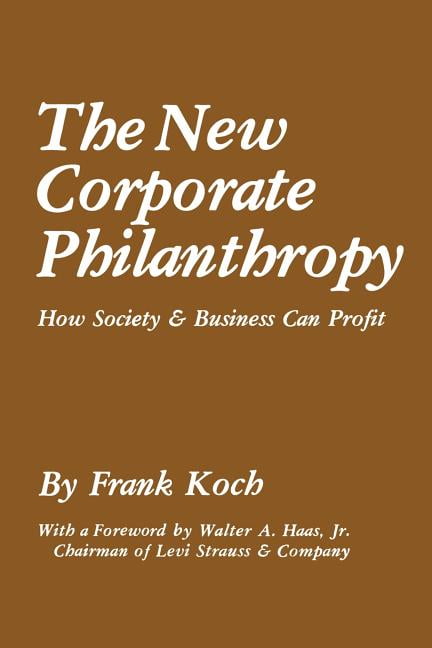The do’s and don’ts of modern corporate philanthropy
Exploring Exactly How Company Philanthropy Shapes Brand Name Credibility and Consumer Commitment
Corporate philanthropy considerably influences brand name credibility and customer commitment. Firms that engage in authentic charitable initiatives often see a favorable shift in exactly how consumers view them. This positioning of values promotes trust fund and psychological links with audiences. The efficiency of these philanthropic initiatives can vary considerably. Comprehending what really reverberates with consumers is essential for brands looking for to improve their social effect and market setting. What techniques will become important for future success?
The Development of Business Philanthropy
As services significantly recognize their duty in society, the development of corporate philanthropy has actually transformed from mere charitable contributions to a tactical component of brand identification. Originally, companies took part in philanthropy largely for tax advantages or to boost their public picture. With time, this approach shifted as stakeholders-- including employees, clients, and financiers-- demanded an extra genuine commitment to social obligation.
Organizations began straightening their humanitarian efforts with their core worths and company objectives, bring about more thoughtful and impactful contributions. This modification has actually urged firms to buy lasting practices and neighborhood growth, fostering a feeling of objective that resonates with customers.
Furthermore, technical innovations have helped with openness and involvement, permitting organizations to showcase their kind efforts more properly. Consequently, company philanthropy has actually emerged as an important component of business technique, with companies welcoming the opportunity to favorably influence society while enhancing their general brand name story.
The Influence of Philanthropy on Brand Perception
While companies participate in kind efforts to advertise social excellent, these campaigns significantly form brand assumption among customers. Business philanthropy can boost a brand name's photo by linking it with positive social effect and community participation. Consumers usually perceive brand names that actively get involved in charitable tasks as even more trustworthy and accountable. This perception can influence getting choices, as consumers might prefer brand names that demonstrate a commitment to social problems.

Structure Emotional Connections With Providing
Company philanthropy serves as a powerful tool for boosting brand name identity by linking corporate worths with community demands. Through strategic offering, business can promote neighborhood engagement and create shared worths that reverberate with consumers on an emotional degree. This strategy not only strengthens brand online reputation yet also builds long lasting connections between companies and their stakeholders.
Enhancing Brand Identification
They not just contribute to social excellent yet likewise create deeper emotional links with their target markets when firms engage in humanitarian efforts. By straightening their brand with charitable causes, firms boost their identity and signal values that reverberate with consumers. This alignment produces a story that exceeds solutions and products, welcoming consumers to join a common goal. As customers progressively focus on purpose-driven brand names, firms that proactively take part in offering can differentiate themselves in a crowded market. Such initiatives foster a sense of loyalty amongst customers that really feel directly connected to the brand name's values. Inevitably, business philanthropy becomes an important device for improving brand identification, growing lasting partnerships based upon shared ideas and emotional interaction.
Fostering Community Involvement
Numerous research studies suggest that firms participating in community-focused humanitarian campaigns can significantly strengthen psychological connections with their stakeholders. By spending in regional projects and supporting social causes, companies cultivate a sense of belonging and count on within the community. This involvement fosters a positive brand picture, as customers value companies that demonstrate authentic concern for social issues. Staff members typically really feel a lot more happy and inspired to be associated with an organization that prioritizes community welfare. Consequently, customers are most likely to create loyalty towards brands that proactively add to meaningful reasons. Inevitably, promoting neighborhood involvement through philanthropy not only improves brand online reputation yet also develops enduring emotional connections that benefit both the area and the company it serves.
Producing Shared Values
Just how can organizations effectively create shared worths that reverberate with their stakeholders? Business can attain this by straightening their philanthropic efforts with their core goal and the passions of their communities. By involving in campaigns that address local demands, organizations cultivate psychological links with consumers, enhancing brand name commitment. Partnering with non-profits that reflect shared worths strengthens the brand name's picture and shows commitment to social responsibility. In addition, clear interaction regarding these efforts allows stakeholders to see the substantial effect of their payments. Ultimately, by integrating shared values right into their business philanthropy, business not just enhance their credibilities but additionally grow lasting connections with clients, leading to increased loyalty and depend on. This placement is important in modern consumer decision-making.
Situation Researches: Effective Philanthropic Campaigns
Analyzing successful humanitarian projects discloses different approaches that improve brand name credibility. Impactful neighborhood campaigns, innovative collaboration designs, and lasting engagement approaches have verified effective in fostering positive links with customers. These instance studies highlight the importance of thoughtful company providing in accomplishing both social and business objectives.
Impactful Area Initiatives
Many business have efficiently leveraged humanitarian projects to enhance their brand name credibility while making a significant impact in their communities. As an example, a modern technology company released an electronic proficiency program in underserved areas, giving training and sources that equipped regional residents. This effort not just added to community development but likewise positioned the company as a socially responsible leader. A major food company applied a hunger relief campaign, partnering with regional see page nonprofits to distribute dishes to family members in requirement. This effort strengthened neighborhood connections and promoted consumer commitment. With these impactful campaigns, companies have actually shown their commitment to social responsibility, properly aligning their brand values with the requirements of the communities they offer, ultimately boosting their general online reputation.
Ingenious Collaboration Designs
The success of impactful area initiatives commonly hinges on ingenious partnership models that bring with each other varied stakeholders to resolve facility social difficulties. Instance research studies illustrate exactly how companies, non-profits, and federal government entities go can team up successfully. For circumstances, an international firm partnered with a regional non-profit to release an education program, pooling resources and proficiency to boost community literacy prices. An additional instance entailed a technology business and a health care company signing up with pressures to establish a telemedicine option for underserved populations. These partnerships not only amplified the reach of humanitarian efforts but also reinforced the brands' credibilities by straightening their goals with neighborhood demands. Eventually, innovative collaboration versions function as a catalyst for meaningful modification and foster more powerful connections in between brand names and their consumers.
Lasting Interaction Methods

Determining the ROI of Business Social Responsibility
As firms increasingly purchase company social responsibility (CSR) campaigns, understanding the roi (ROI) connected with these initiatives becomes essential. Determining ROI in CSR is diverse, frequently including both measurable and qualitative metrics. Monetary returns can be assessed through boosted sales, boosted brand commitment, and boosted worker morale, which can result in higher efficiency. Furthermore, business might examine cost savings connected to sustainable methods, such as minimized waste or energy consumption.
Qualitatively, the influence of CSR on brand track record can be evaluated through consumer assumption researches and social networks belief analysis. Studies can provide understandings right into exactly how CSR activities influence consumer commitment and depend on. Benchmarking versus market criteria can aid companies assess their CSR effectiveness - corporate philanthropy. Ultimately, a complete approach to determining ROI makes it possible for companies to make enlightened decisions about future CSR financial investments, aligning techniques with both financial performance and social effect
Consumer Expectations and Corporate Responsibility
Progressively, consumers anticipate business to run with a strong feeling of corporate duty, seeing moral methods as a prerequisite for brand name loyalty. This shift in assumption mirrors an expanding understanding of social and ecological problems, leading customers to prefer brand names that straighten with their worths. Consumers are extra inclined to support firms that take part in clear techniques, show sustainability, and contribute positively to their areas.
Additionally, social media sites magnifies these assumptions, permitting customers to share their viewpoints and experiences quickly. Brands that fall short to fulfill these honest criteria take the chance of backlash, while those that welcome corporate obligation often appreciate enhanced credibility and client commitment. As consumers demand liability, business need to integrate business social responsibility into their core strategies, focusing on ethical actions not equally as a marketing approach, but as an essential element of their procedures. This positioning can ultimately cause stronger brand affinity and sustained success in open markets.
Future Patterns in Company Philanthropy and Brand Name Loyalty
The landscape of corporate philanthropy is advancing, influenced by the intense consumer expectations surrounding business obligation. Firms are significantly incorporating social impact right into their core service techniques, not merely as a secondary task. Future trends show a shift towards transparency, with brands sharing thorough details concerning their philanthropic initiatives and their direct results on communities.
Technology is playing a vital function, making it possible for real-time engagement in between consumers and brands. Social media systems help with straight communication, enabling consumers to articulate their expectations and hold brands accountable. Furthermore, younger generations, especially Millennials and Gen Z, prioritize sustainability and ethical techniques, driving companies to embrace even more conscientious strategies.
As business philanthropy ends up being associated with brand identity, business that authentically align their objectives with social needs are likely to foster stronger customer loyalty. This convergence of worths will ultimately form the future of business reputation and customer relationships in a progressively conscientious industry.
Often Asked Concerns
Just How Do Customers Discover Out Regarding a Business's Philanthropic Efforts?
Customers uncover a firm's humanitarian initiatives via different channels, consisting of social media sites, press releases, neighborhood events, and word-of-mouth. These methods facilitate understanding, making it possible for individuals to involve with brands that line up with their values and interests.
What Function Does Staff Member Involvement Play in Business Philanthropy?
Employee involvement in business philanthropy boosts engagement, fosters a sense of possession, and reinforces team cohesion - corporate philanthropy. This participation usually enhances the effect of philanthropic campaigns, leading to greater awareness and support for the business's humanitarian efforts
Can Corporate Philanthropy Backfire on a Brand's Track record?
If perceived as insincere or opportunistic, company philanthropy can without a doubt backfire on a brand name's track record. Unfavorable public understanding may develop, bring about lessened count on and commitment among customers who prioritize credibility in company activities.
Are Smaller Sized Companies as Effective in Philanthropy as Larger Companies?
Smaller companies can be just as efficient in philanthropy as bigger companies, typically demonstrating dexterity and authenticity. Their local initiatives may reverberate much more deeply with areas, promoting real connections in spite of minimal resources compared to their larger equivalents.
Exactly How Can Business Choose the Right Creates to Assistance?
Business can choose the best reasons by aligning their values with neighborhood demands, evaluating stakeholder passions, and evaluating prospective effect. This critical method promotes credibility, improves involvement, and reinforces links with consumers and the more comprehensive community.
While companies involve in philanthropic efforts to advertise social excellent, these initiatives significantly shape brand perception among customers. As customers significantly focus on purpose-driven brands, business that actively engage in giving can separate themselves in a jampacked market. Several business have effectively leveraged humanitarian campaigns to boost their brand name track record while making a significant impact in their areas. Significantly, consumers anticipate business to operate with a solid sense of corporate duty, checking out ethical techniques as a prerequisite for brand commitment. As corporate philanthropy comes to be synonymous with brand name identity, business that authentically align their goals with societal needs are likely to cultivate stronger customer loyalty.